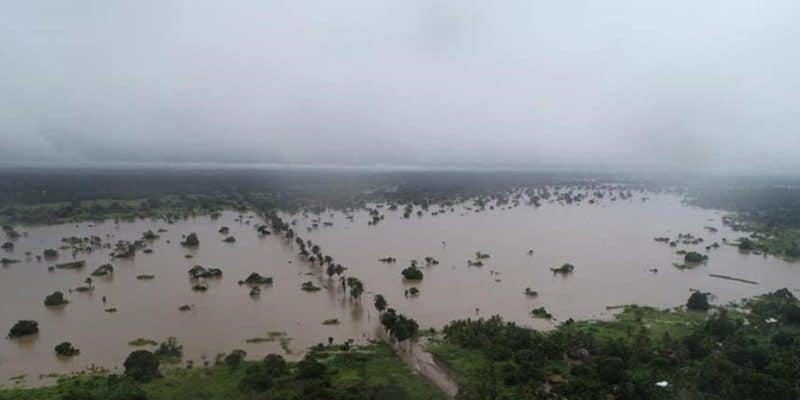In Boane, northern Mozambique, floods on 11 February 2023 destroyed fields and swallowed up two bridges that serve as a commercial link to the capital Maputo. The disaster, caused by global warming, threatens the food security of the people of this East African country, which is used to heavy rainfall between mid-October and March.
While storms have already destroyed 142,000 hectares of farmland since 2019 according to the National Institute for Disaster Management and Reduction (INGD), Mozambique has recently experienced further flooding. The latest toll is four dead and 14,000 displaced, including in Boane, a district 27 kilometres from the capital Maputo.
The damage caused by the storms includes the cutting of power lines of the state-owned Electricidade de Moçambique (EDM) and the destruction of plantations run by small-scale farmers. In Boane, this situation is affecting the food security of around 99,000 people whose livelihoods depend mainly on food crops (rice, wheat, maize, sorghum). These crops from Boane will not be transported to Maputo for the time being, as the bridges between the two cities have been untied by the floods.
Earlier in 2022, Tropical Storm Gombe, with gusts of 170 km/h, swept away roofs and collapsed walls, leaving 30,000 Mozambicans without electricity, particularly in Nampula and Zambézie in central Mozambique. The disaster came three years after Cyclones Idai and Kenneth, which also killed hundreds of livestock and put biodiversity protection back on the agenda in the East African country.
Climate resilience to natural disasters
Mozambique is home to one of the richest biodiversities in Africa, including the Limpopo National Park, which is home to 147 species of mammals and more than 500 species of birds on the South African border, and the Niassa National Reserve, which covers about 42,000 km² (equivalent to the area of Guinea-Bissau, more than 36,000 km²) with its wildlife potential of elephants, lions, leopards and hippos. However, in recent years these natural areas have paid the price of floods, civil war (1990), illegal logging and poaching, accentuated by population growth.
Read also-MOZAMBIQUE: Irish researchers promote « sustainable urban agriculture
For this reason, the Mozambican authorities built an ecological park in 2020, covering an area of 45,000 m2 in the municipality of Beira. At a total cost of 20.7 million dollars (1.3 billion Mozambican meticais), financed in part by the Kreditanstalt für Wiederaufbau (KfW), the German development agency, the site will improve the drainage system in this city, which is plagued by flooding and coastal erosion.
Benoit-Ivan Wansi







